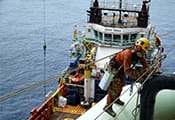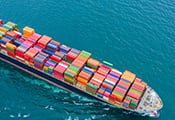Here are the 10 things that you should ask from your insurance agent before buying a marine insurance policy:
-
Physical Damages: What type of losses are covered?
Understanding the type of risks covered is crucial. A comprehensive marine insurance policy should shield against diverse losses—be it damage to the vessel, goods in transit, loss due to theft, liabilities arising from accidents, etc. The insurance policy ensures your business vessel sails with all-encompassing protection. Hence, don't forget to ask this question from your insurance agent before making the final decision.
-
What is not covered?
The devil is in the details. Discovering the exclusions is vital to avoid potential pitfalls. Whether it's specific natural disasters, insufficient packaging or an unfit container, knowing what is not covered prevents your ship from claim denials.
-
Policy Limits and Deductibles
Policy deductibles are the predetermined amounts that policyholders must pay out of their own pocket before their insurance coverage kicks in. For instance, if you have a policy with a deductible of ₹500 and file a claim for ₹2,000, you'll need to pay the first ₹500, and the insurance company covers the remaining ₹1,500.
Apart from this, policy limits in insurance refer to the maximum amount an insurance company agrees to pay for covered losses within a specified period or under a particular policy.
We hope you now understand how important it is to know if there are any deductibles or limits in the policy you plan to consider. Knowing about these parameters is like having a clear navigation plan, securing your ship against unexpected financial storms and ensuring a steady course in the vast sea of budgetary challenges.
-
Premium
Premium is one of the most important things you must ask your insurance agent about marine insurance. Because understanding how much a cargo insurance policy will cost is crucial for maintaining a balanced budget. By knowing the breakdown of premium, you can embark on your business voyage with financial confidence, ensuring sustainability despite the unpredictable nature of the sea.
-
Claim Process
When the storms hit, a streamlined claim process is your lifeboat. Understanding how to initiate and navigate the claim process ensures a quick response to potential damages, preventing your ship from sinking in the face of unforeseen adversities. So, make sure to ask your insurance agent about the claim process in detail.
-
Loss Settlement: Agreed Value vs Actual Cash Value?
ACV, or the Actual Cash Value, is the property's current market value, accounting for depreciation. On the other hand, Agreed Value is a predetermined amount agreed upon by the insurer and the policyholder.
Before purchasing the policy, ask your insurance agent about the value they will use at the time of loss settlement. It will help you decide whether to repair or replace damaged parts, ensuring your ship stays ready for future journeys.
-
Legal & Compliance Considerations
Sailing smoothly requires adherence to legal and compliance guidelines. Knowing the legal obligations and compliance considerations ensures your vessel doesn't encounter legal storms. So, don't forget to ask your insurance agent about the legal and compliance considerations involved.
-
Customer Support & Services
A dependable support system is essential in navigating unpredictable waters. Evaluating customer support and services ensures a reliable partner in handling challenges effectively. So, ask your insurance agent about the type of customer support and services they provide. See if it is what you are looking for before making a decision.
-
Industry Specific Risks
Don't forget to inquire about industry-specific risks before purchasing a marine insurance policy. This will help ensure the policy adequately addresses your business or sector's unique challenges and exposures.
For example, for an industry like Fast-Moving Consumer Goods (FMCG) dealing with perishable goods, industry-specific risks may include the time-sensitive nature of transporting products with limited shelf life. In this case, a marine insurance policy should be tailored to address potential losses or damages related to temperature control failures, delays, or spoilage during transit.
In a similar manner, if an exporter has obtained insurance to protect their ships or vessels, their hull insurance policy will also need to be adjusted to address their specific risks.
-
How much coverage should I take for Marine Insurance?
Determining the ideal coverage for your marine insurance is a strategic decision that involves evaluating various factors. These include the value of your vessel, the type of cargo you transport, potential liabilities, and industry-specific risks.
To strike a balance between comprehensive coverage and budget considerations, consulting with your insurance agent is crucial. This will help you ensure that the chosen coverage aligns with potential risks, providing adequate financial protection during unforeseen events on the high seas.







































 Expert advice made easy
Expert advice made easy


